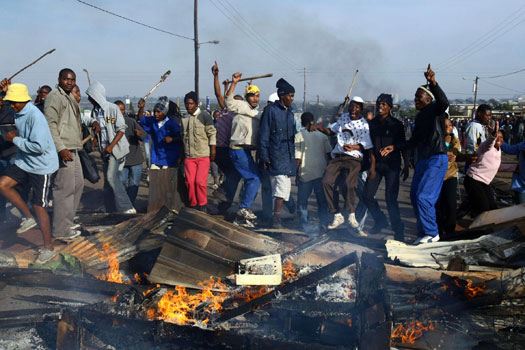Xenophobia in South Africa
At the end of May in South Africa, a lot of violence erupted, apparently targeted against other black africans by fellow black South Africans. Meeting other Nigerians, almost all of them, given a little time, bring up the subject. I found myself having to apologise for the violence, and make some explanation of it.

I had left for Nigeria the week before, to install the computer network at the african University for Science and Technology.
Bobby, a System Administrator I have just hired at the University, was especially pained. He explained the efforts Nigeria had gone to protest the Apartheid regime, and in strong support of black South Africans at that time, and the special place South Africa holds in their hearts because of the success of the campaign.
Though South Africa was at the other end of the continent, Nigeria was listed with the Frontline States due to its opposition to Apartheid. Almost to the exclusion of everything else, it made anti-Apartheid the cornerstone of its foreign policy in the ’70s.
- Alhaji Tafawa Balewa, Nigeria’s Prime Minister, stopped the employment of White South Africans in the Nigerian Public Service.
- Nigeria sponsored the expulsion of South Africa from the Commonwealth in 1961.
- Nigeria gave scholarships to 200 South Africans to come to Nigerian universities and study.
- The Montreal Olympics were boycotted by many African countries including Nigeria, dashing the hopes of many Nigerians who had trained for four years hoping to carry away a medal. South Africa were not even present - the dispute was with New Zealand, whose national rugby union team (the All Blacks) continued to play rugby with South Africa.
- Nigeria nationalised British Petroleum in protest against British involvement with apartheid South Africa. BP became African Petroleum.
- The Federal State and Local governments closed all their accounts with British owned Barclays Bank, in protest against their links with the apartheid regime. Because of all the bad publicity, the bank had to change its name to Union Bank.
- The National Committee against Apartheid was set up. All Nigerian workers were made to contribute one Nigerian pound, which was deducted from their salaries, for the purposes of the liberation struggle in Southern Africa.
I picked these out because they are specifically about Nigeria. Other frontline states have their own records of defiance - I do not mean to elevate Nigeria above all the other nationalities that have suffered in the violence. Somalisin South Africa have a pattern of opening Spaza shops within the townships- reducing the need for residents to travel to town to do their shopping. They are successful
- they work hard. They are attacked because of envy and greed -not because they are taking away employment. Why were there no shops in the townships in the first place ? Because financially successful township residents toss their heads and declare it is beneath them to do business there- they are going to town.
South Africa - shame on you. Those who do not study history are condemned to repeat it.